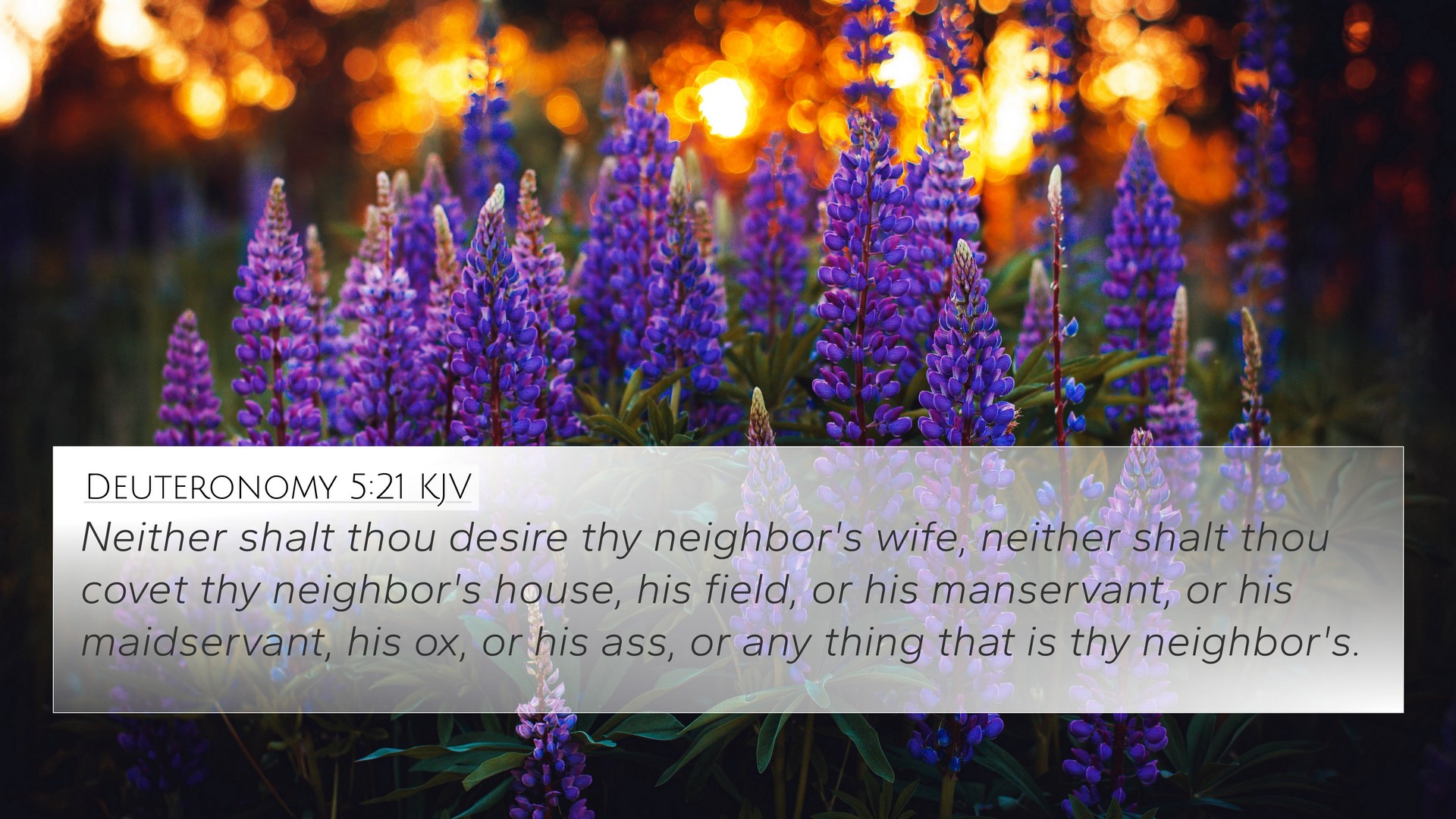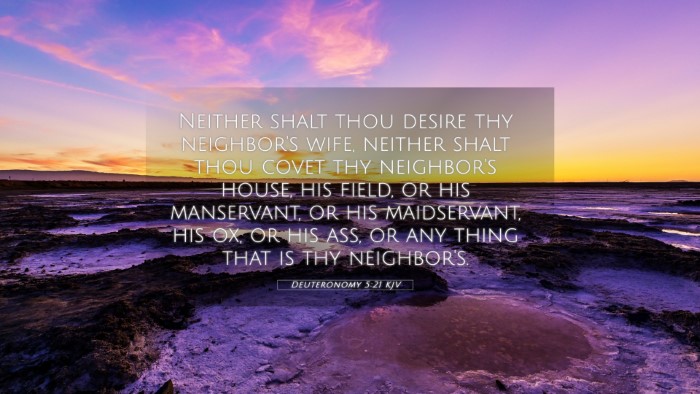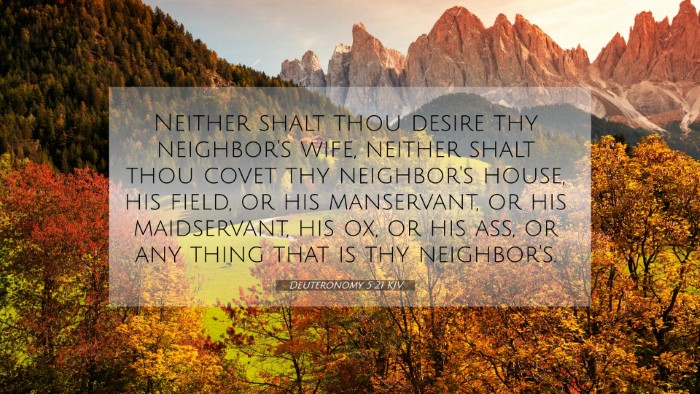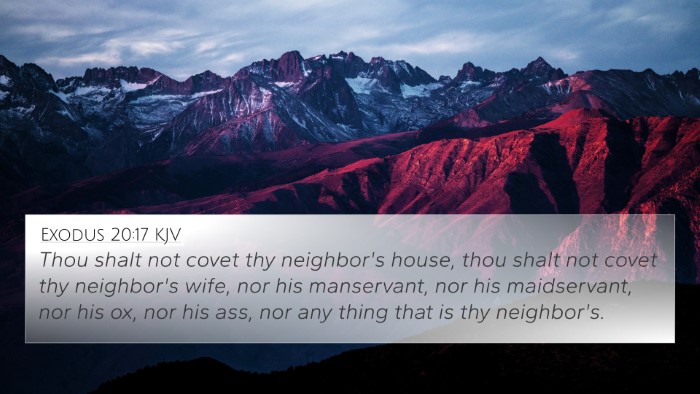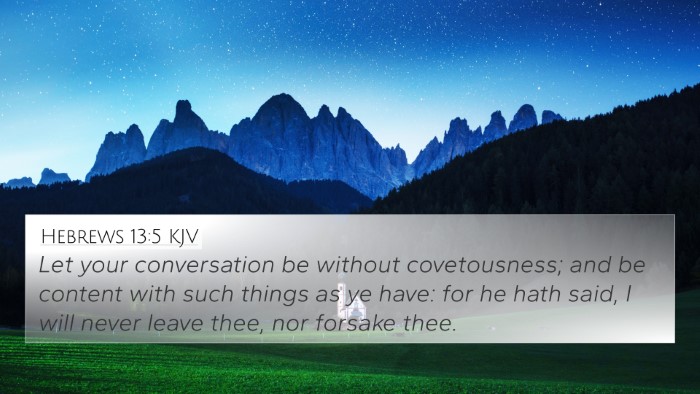Understanding Deuteronomy 5:21
Verse: "Neither shalt thou desire thy neighbor's wife, neither shalt thou covet thy neighbor's house, his field, or his manservant, or his maidservant, his ox, or his ass, or any thing that is thy neighbor's."
Summary of Deuteronomy 5:21
This verse commands against coveting or desiring what belongs to others, emphasizing the importance of contentment and respect for one's neighbor. The verse lays a foundation for ethical behavior in the community by stemming from the principle of love and respect for one's neighbor.
Commentary Insights
-
Matthew Henry:
Matthew Henry remarks that this commandment highlights the internal desires that lead to external actions. He emphasizes that without controlling one's thoughts and desires, one can easily transgress in actions, which is why this internal command is so crucial.
-
Albert Barnes:
Albert Barnes focuses on the concept of covetousness, stating that it's not merely a prohibition against actions but against the thoughts and desires that lead to sinful actions. He explains that this commandment fosters harmony within society by discouraging jealousy and discontent.
-
Adam Clarke:
Adam Clarke points out the broader implications of coveting, noting that it can lead to more severe sins, such as theft and adultery. He interprets this commandment as a safeguard for community and relationship dynamics, ensuring that individuals do not harbor ill will towards one another.
Bible Verse Cross-References
- Exodus 20:17: "Thou shalt not covet thy neighbor's house; thou shalt not covet thy neighbor's wife, nor his manservant, nor his maidservant, nor his ox, nor his ass, nor any thing that is thy neighbor's."
- James 4:2: "Ye lust, and have not: ye kill, and desire to have, and cannot obtain: ye fight and war, yet ye have not, because ye ask not."
- Colossians 3:5: "Mortify therefore your members which are upon the earth; fornication, uncleanness, inordinate affection, evil concupiscence, and covetousness, which is idolatry."
- Luke 12:15: "And he said unto them, Take heed, and beware of covetousness: for a man's life consisteth not in the abundance of the things which he possesseth."
- Proverbs 24:1: "Be not thou envious against evil men, neither desire to be with them."
- 1 Timothy 6:10: "For the love of money is the root of all evil: which while some coveted after, they have erred from the faith, and pierced themselves through with many sorrows."
- Hebrews 13:5: "Let your conversation be without covetousness; and be content with such things as ye have: for he hath said, I will never leave thee, nor forsake thee."
Connections Between Bible Verses
The commandment against coveting in Deuteronomy resonates through various books of the Bible. The New Testament, particularly in passages like James 4:2 and Colossians 3:5, reinforces the destructive nature of covetous thoughts and desires.
By cross-referencing these scriptures, we find that many teachings throughout the Bible, including Jesus' teachings in Luke 12:15, reflect the core values outlined in the Old Testament commandments regarding desire and ethical living.
Thematic Bible Verse Connections
The theme of contentment vs. covetousness is prevalent throughout Scripture. It is illustrated in the life of Job, who despite his losses remained faithful, contrasting sharply with the mindset of covetousness which can lead to discontent.
In the New Testament, Paul's teachings also draw attention to the importance of being satisfied with what one has, echoing the sentiments conveyed in Hebrews 13:5 and others that discourage the longing for material possessions.
Cross-Referencing Bible Study Methods
Utilizing a Bible concordance or a cross-reference Bible study guide can greatly enhance understanding of themes like the one presented in Deuteronomy 5:21. By identifying connections between this verse and others, students and scholars alike can better interpret the Scriptures in their entirety.
When searching for related verses or exploring how certain scriptures connect, it's beneficial to consider the thematic elements that run through the texts, holistic understanding of God’s character and His expectations of His people.
Conclusion
In conclusion, Deuteronomy 5:21 serves not just as a prohibition but as an insightful reminder of the internal battles of desire that everyone faces. The cited commentaries bring forth a rich understanding of this commandment's relevance and importance, while the cross-references provide a comprehensive perspective on how pervasive the issue of coveting is throughout the Bible.
Whether one is embarking on a personal study, preparing a sermon, or simply seeking to understand better the connections between Bible verses, reflecting on Deuteronomy 5:21 in light of its cross-references adds significant depth to the overall comprehension of Biblical ethics and God's intentions for human relationships.
